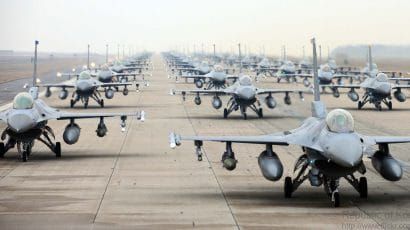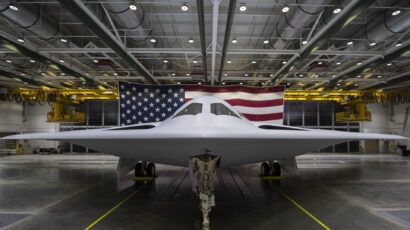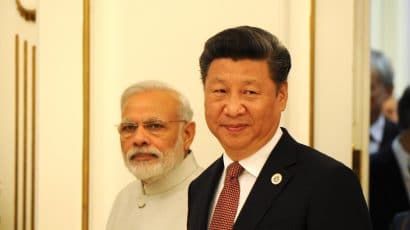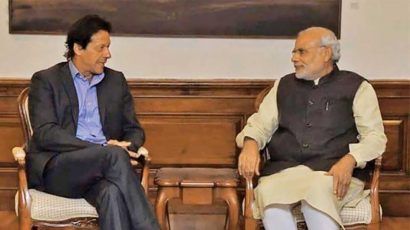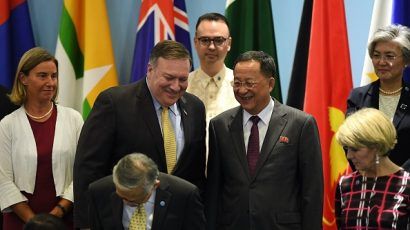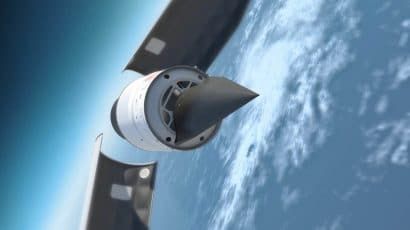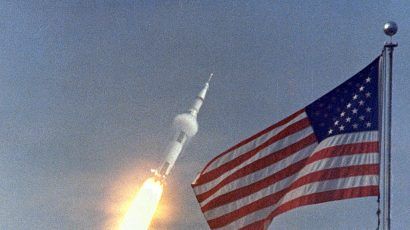Search results for autonomous weapon
Why cheap drones pose a significant chemical terrorism threat
Cheap new drones may be increasing the risk of attacks on chemical facilities or chemical weapons use, even as Congress backslides on protecting against chemical terrorism.
How to keep South Korea from going nuclear
The South Korean public debate on the country’s future nuclear options has recently extended beyond the usual pro-nuclear, conservative fringe voices of the past. Still, South Korea’s opposition to nuclear weapons remains strong. But Seoul’s nuclear abstinence must not be taken for granted.
Crisis management: A good lesson to learn?
Last month three terror attacks once again struck Mumbai, killing approximately 25 people. The attacks turned out to be the doing of an India-based Islamist outfit, the Indian Mujahedeen, and did not involve Pakistan-based Islamist militants.
In the media coverage since, terrorism experts on South Asia have posited that this attack was not a decisive shift in Islamist terrorism in India -- their argument, instead, was that Pakistan-based militants, increasingly autonomous in their operations, still remain the most likely source of a large-scale attack on Indian soil.
Why the congressional strategic posture report is not about nuclear deterrence, but warfighting
The Commission paints a bleak picture of the near-term international security environment, but its recommendation to expand the US nuclear arsenal would make a bad situation worse.
India–China border dispute: the curious incident of a nuclear dog that didn’t bark
The nuclear dimension of the recent border clashes was conspicuous by its invisibility. Can the rest of the world learn from it?
The nuclear mission must stay manned
The trouble with unmanned nuclear bombers is that there's no "human circuit-breaker"
Interview: Rose Gottemoeller on the precarious future of arms control
In this interview, American diplomat Rose Gottemoeller discusses reengaging with a saber-rattling Russia, negotiating with China, and how arms control frameworks can adapt to AI and other emerging technologies.
Another reason to cancel the Sentinel missile: the rising cost of its nuclear warhead
The total cost of the Sentinel missile, when you include all the costs of the warhead it will carry, will be more than $185 billion. The ever-increasing price tag for the new intercontinental ballistic missile strengthens the case against it.
India, Pakistan, Kashmir: Taking the war option off the table
On September 27, Prime Minister Narendra Modi of India and Prime Minister Imran Khan of Pakistan will address the United Nations General Assembly in New York. This appearance will come at a time of great concern about the increasingly hostile relationship between their two countries. Now is a good time to resurrect an old idea proposed at various times by both India and Pakistan but never fully agreed: a binding commitment never to resort to war to settle their disputes.
Putin’s folly in Ukraine
How Putin has undermined Russian interests with his actions in Ukraine, and why the United States needs to help Russia find a face-saving way to withdraw its forces from Crimea.
Obama’s test: Bringing order to the national security policy process
During the Bush administration, funding for the Defense Department, State Department, and Department of Homeland Security more or less doubled. But in all three cases, the goal of the budget increases wasn't to create functioning, efficient, and effective bureaucracies. Instead, it was to push a political agenda--at the cost of effective management. As a result, all three departments emerge from the last eight years less focused, less disciplined, and less effective.
Humans should teach AI how to avoid nuclear war—while they still can
The systemic use of AI technology in nuclear strategy, threat prediction, and force planning could erode human skills and critical thinking. It could also lure users into believing that a nuclear war cannot be won.
Artificial intelligence: challenges and controversies for US national security
The United States and other countries must consider the possible impact of AI on their armed forces and their preparedness for war fighting or deterrence. Military theorists, strategic planners, scientists, and political leaders will face at least seven different challenges in anticipating the directions in which the interface between human and machine will move in the next few decades.
Donald Trump and Kim Jong-un need the European Union
US-North Korea negotiations are stuck. Trump should deploy the European Union.
Atomic Homefront: a film about struggling to live with Manhattan Project radioactive waste
The film tells the story of the communities living in the North St. Louis County as they fight against the illegal dump of radioactive materials at the West Lake Landfill and the contamination spread around Coldwater Creek. The film has a dramatic progression as an underground fire, known in bureaucratese as a subsurface smoldering event, on the Bridgeton side of the landfill gets closer to the West Lake side where the radioactive materials are located.
Hypersonic missiles: Why the new “arms race” is going nowhere fast
Recent concerns that Washington is “behind” in a hypersonic arms race are unwarranted. Hypersonic missiles do not shift the strategic balance, and the United States stands to gain very little by deploying its own.
How Beijing can help prevent nuclear terrorism
China’s nuclear establishment needs a cultural shift.
How likely is an existential catastrophe?
You’re far more likely to die in an existential catastrophe than you think. And the risk of such a catastrophe is growing.
Bad moonshot rising: The moon’s dubious strategic value
Beating China to an objective that the United States aleady achieved 50 years ago would win few hearts or minds. It's an aim that seems of dubious worth in an international landscape defined more by geo-economic than ideological competition.


